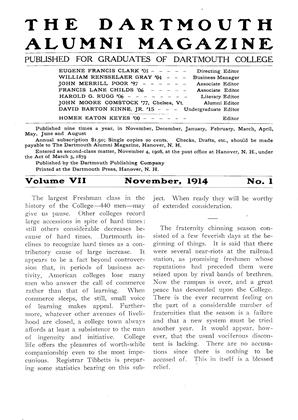The evening of October 9 was celebrated more widely than ever before as a time for gathering the Dartmouth clans, and the phrase nation-wide is no misnomer for the occasion. Simultaneously with the meeting in Webster Hall a dozen groups gathered in New England, and from various centers throughout the continent greetings were continually arriving, until at the opening of the meeting in Webster Hall, twenty-seven Associations had been heard from, or as it was phrased in the despatch from Boston, had "added another blazing log to the everlasting fire now burning in Webster Hall".
The largest gathering outside of Hanover was in Boston, where three hundred and fifty alumni were present to listen to the message of the College brought by Dean Laycock. At the same time Professor Wicker was addressing a similar group of Springfield alumni, while at more distant points resident alumni supplied the oratory and enthusiasm. To mention only a few of the gatherings, the Dartmouth line extended through Washington and Philadelphia, through Albany and Buffalo to Cleveland, Chicago, St. Louis, Denver, Manhattan (Montana), Seattle, Portland, and San Francisco. All reported full attendance and enthusiasm, while the Seattle group contributed to the Dartmouth anthology some verses from the pen of Roger S. Green '55. As indicative of the spirit of the evening the song, entitled "Dartmouth Night" is here printed:
DARTMOUTH NIGHT
O what am I to Dartmouth ?
And what to me is she ?
In her I've Alma Mater; A son she has in me.
On Dartmouth Night we gather, Near by or far away, Our tables touch each other, And night is turned to day.
Fond memories restore us The faces and the names, The College is before us, The studies and the games.
To thee, O Dartmouth, Mother, In sunshine or in night To love thee and to cherish, My fealty I plight.
To be, as to no other, As long as life-blood runs, A son to thee, my Mother, A brother to thy sons.
All interest, however, was naturally focused on Hanover and Webster Hall. Of the nineteen occasions on which Dartmouth Night has been celebrated, the observance this year will rank among the first in general interest. Marshalled by members of Palaeopitus, the undergraduates marched in by classes, and gave a cheer for the college baby, 1918. As presiding officer, President Nichols was the first speaker. In developing the significance and purpose of Dartmouth Night, he brought out the interesting fact that Dartmouth is almost the only old historic college that can look forward to a future on its original site, others having been forced to move owing to the crowded conditions or the value of the site. In this process of moving a valued continuity is lost. But surroundings make only for an ancient college, not for an historic one. The latter is due only to men. So the strength of the future college will be due to the type of men sent out. The loss to the College sustained in the death of Judge Cross had been mentioned in many of the telegrams, and it was fitting that the assemblage in Webster Hall should pay him a tribute, standing in silence. In the words of President Nichols "It will be long before we see again the past looking down upon us from so great a distance and through so kindly eyes". Following President Nichols' address, Mr. Wallace Robinson, the donor of Robinson Hall, was greeted with a cheer, and similarly a message of gratitude and good cheer was sent to Mr. and Mrs. Edward Tuck in recognition of the gift of the Tuck Drive, and to Dr. and Mrs. Tucker.
The next speaker, Thomas W. Proctor '79, directed his remarks especially to the freshmen "at the entrance of the gateway of the world". After asking the question how the College, so remote and isolated, had preserved herself and grown to such a size that the present freshman class is larger than the whole College forty years ago, he answered it by the statement that she has "done her best day by day one day at a time", and recommended that as the aim of the individual freshman.
After singing "As the Backs Go Tearing By" and "Glory to Dartmouth", C. B. Jordan '15 spoke most effectively as representative of the undergraduates. In analyzing the Dartmouth spirit he found three elements: loyalty, democracy, and service, and told his auditors to believe in the Dartmouth spirit, and work until only that is left.
At this point the messages from the. Alumni Associations were read by Professor Herbert D. Foster '85, after which the President introduced Andrew Marshall '01. Taking as his text Richard Hovey's "Men of Dartmouth", which he quoted most impressively, he pointed the lesson that character is the. prime essential, and loyalty through character the only real loyalty.
As the closing speaker, Professor E. J. Bartlett portrayed in delightfully humorous vein various aspects of life in the opening days of college and the growing complexity of life in Hanover. The serious situation in world affairs, due to the European conflict he also made touchingly vivid with reminiscences of our own Civil war period.
 View Full Issue
View Full Issue
More From This Issue
-
 Article
ArticleADDRESS DELIVERED AT THE FUNERAL OF JUDGE CROSS OCTOBER 5, 1914
November 1914 By Ernest Fox Nichols -
 Article
ArticleADDRESS DELIVERED AT THE OPENING OF COLLEGE – SEPTEMBER 24, 1914
November 1914 By Ernest Fox Nichols -
 Class Notes
Class NotesLOCAL ASSOCIATIONS
November 1914 -
 Class Notes
Class NotesCLASS OF 1841
November 1914 -
 Article
ArticleThe largest Freshman class in the history of the College
November 1914 -
 Article
ArticleFACULTY CHANGES
November 1914








